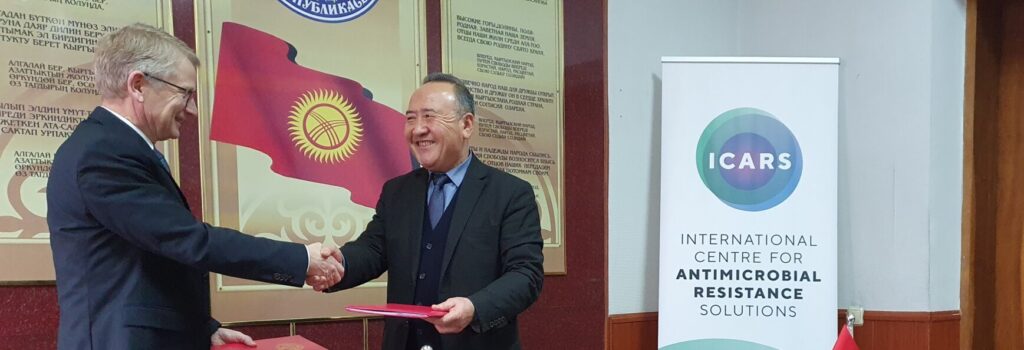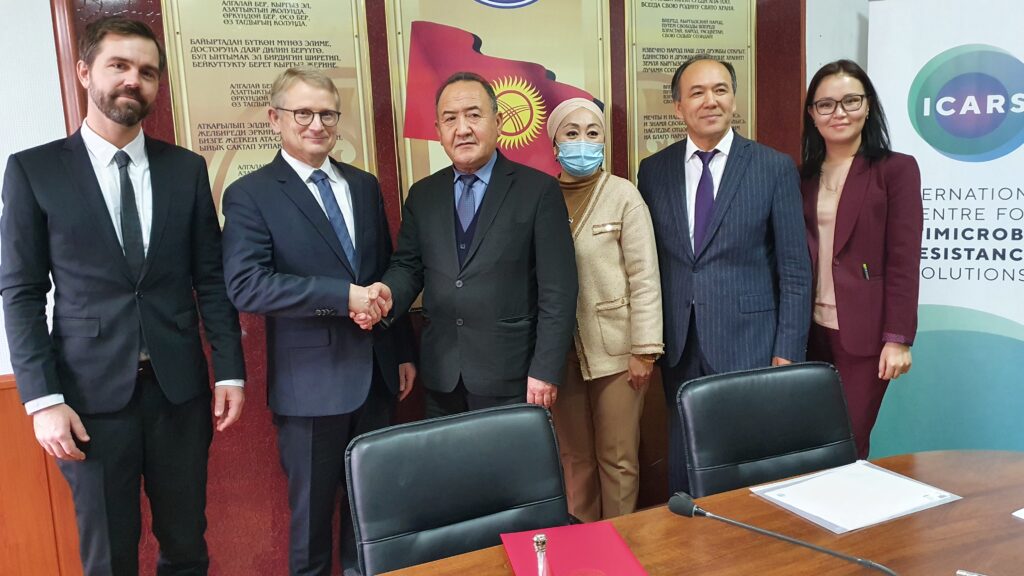On 15 December 2021, ICARS’ Scientific Director, Robert Skov met with representatives from the Kyrgyz Republic Ministry of Health (MOH) to sign a Memorandum of Understanding. The signing ceremony marks a shared commitment to begin an integrated intervention research/implementation project on antimicrobial resistance (AMR).
The project aims to facilitate appropriate antibiotic use for treating children with respiratory tract infections in Kyrgyzstan, by measuring C-reactive protein (CRP) using a rapid point-of-care test.

Context
In the Kyrgyz Republic, an interagency programme and an action plan to contain AMR and have been developed, but these are currently still under discussion. While the MOH is committed to AMR mitigation by supporting rational antibiotic use, lack of resources and evidence-based research mean that many issues are not currently being addressed. There are limited studies on AMR in the Kyrgyz Republic, so despite being a member of the Central Asian and European Surveillance of Antimicrobial Resistance (CAESAR) network, they are not reporting data into the network. In addition, like many other low-middle income countries, there are large gaps in the training of doctors, nurses and pharmacists, so the issue of rational prescription of antibiotics has not been resolved.
Problem
Respiratory tract infections (RTIs) are the most common cause of contact to the health system and are the main reason for antibiotic overuse at the primary care level around the world. Acute lower respiratory infections (ALRI) are the most common cause of death among children under 5 globally. In 2020, respiratory diseases accounted for 49.7% of child morbidity in children aged 0-14 years in the Kyrgyz Republic.
With increasing vaccine coverage, and a range of causes of respiratory infections, only a small proportion of these illnesses require antibiotics. In the Kyrgyz Republic, most children are diagnosed and treated at a primary care clinic, primarily by mid-level providers (nurses and feldshers) with only limited access to diagnostic equipment. To assist health care providers in diagnosing under these conditions, various algorithms have been used but this approach has been shown to over-diagnose pneumonia and result in the unnecessary prescription of antibiotics. New approaches to diagnosing and treating respiratory infections in children are needed.

Project
The project will be made up of a few components including:
- An Individually randomized controlled trial to determine the effectiveness of a point of care test (POCT) to measure the level of C-reactive protein (CRP), an inflammation marker indicating severe infection. This diagnostic tool helps health care workers to identify whether children with RTIs need antibiotics. The trial will be carried out in a total of 14 different primary health care centres in the Chui and Naryn regions of Kyrgyzstan.
- An Implementation Research component documenting the study from inception, including qualitative interviews to ascertain the barriers and enablers to implementation as well as other implementation research outcomes such as acceptability, adoption, appropriateness, cost-effectiveness, coverage, feasibility, fidelity and sustainability.
- A health economic study to assess the economic feasibility of the intervention.
- A microbiological study to identify pathogens causing RTIs in children in the study areas.
Next steps
Following the signing of the MOU, we will continue co-develop the project proposal and work towards getting the project implemented on the ground. Keep an eye on our project pages for future updates.
If you are interested in partnering with ICARS find out more here.

